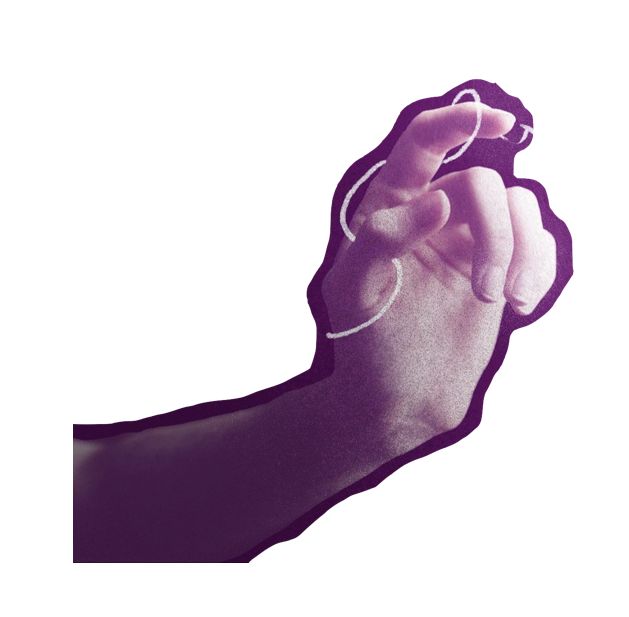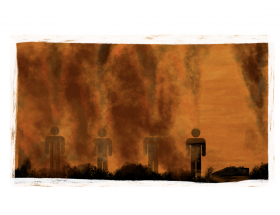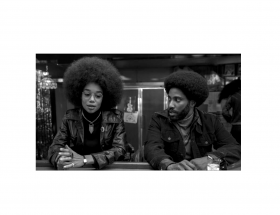Time. The great teacher, the great healer, the greatest ceremony of humanity. Time, coupled with reflection, allows us to grow, to progress, to figure out what worked for us, and what didn’t. The measurement of time allows us to label who we were in a specific period of our individual development. This, in turn, allows us to form the concept of the past.
We often distance ourselves from our past. We often look back at our former selves with a slight cringe and shiver. We delete our old One Direction twitter fan accounts in a fit of embarrassment, in hope that our future employers never see that part of our online footprint (or was that just me? Cheers to 10 years of 1D baby!) In the same way that we look back at our individual histories, as a species, we also tend to distance ourselves from our collective “dark” histories,those of which we have now emerged from. As we modernise, as we advance as a species, we form a past riddled with mistakes. With retrospect, we dub the culture and social norms of that period as outdated in order to distance ourselves from our shared past.
Historical morality is a difficult topic to approach. How we should analyse the behaviour of people of the past is a difficult thing to digest and process, as each era and each generation is steeped in its own cultural and social condition particular to its time. It is incredibly difficult for us to begin to understand the collective mentality of the generations let alone centuries of people before us, as it is something we will never individually experience ourselves. Most of us hold the belief that we have “modernised” – we have adapted, we have progressed, times have changed; so thus, we cannot hold people of the past to the standards we hold people of our present to. However, how far is this idea of our society being “modernised”, this idea that we are distant from the culture and people of our histories, excusing a lack of humanity of people in the past?
Lock-down has coincided with (or induced?) a series of social, political and cultural shifts. One of the most prominent being the resurgence of the Black Lives Matter movement in the wake of the murder of George Floyd, which has forged a large debate about social morality. Everything is being re-examined: our history, our statues, our public reverence for certain individuals, our national celebrations. The founding fathers of America are being called into question in mainstream debates: were they liberators who were building a nation based in the principles of “liberty and justice for all”, or did they facilitate the free world to be built on the backs of slaves? Was Winston Churchill a charismatic and genuine leader, or was he a white supremacist who facilitated the Bengal famine? Or possibly, could these characters exist in both identities simultaneously?
Oppression in its many forms has always been woven into the fabric of humanity. Slavery worked its way into society as we transformed from a hunter-gatherer society into one with a more complex economic system, in which the cheapest form of labour was most favourable. The institutions and people who have perpetuated suffering for any type of personal gain (economic, social, political, etc.) should be held accountable. The founding fathers of America, Churchill, and many, many other human beings throughout history (and in our present time) stripped other humans of their dignity, their safety and their comfort – and they need to be held accountable for this. It should not be controversial to have discussions about the flaws of the people who came before us, especially those who wielded power, as surely, surely, we need to do so in order to truly modernise, if we are describing that as a process of adapting and progressing. Despite disparities in cultural and social norms throughout time, the one thing we can be assured that all humans have had access to throughout history is our emotions. Although emotions and the understanding of emotions themselves are also steeped in their own cultural conditions, feeling is undeniable. We always have access to our empathy. The only thing that ties each individual together throughout history is our shared sense of humanity. So, how can we excuse the behaviour of the people of our past which perpetuated suffering as a sign of the time? How can we let accountability partially, or wholly, slip away, due to our tendency to believe that they did not know better, as they were not grounded in the same moral code that we now uphold?
As activist Munroe Bergdorf put it recently on Jameela Jamil’s I-Weigh podcast, we currently live in the era of accountability. Accountability in the modern context is constantly and rapidly taking new forms. We live in the era of cancel culture, of “woke” culture, of twitter wars, and of Instagram slide-shows informing any user who stumbles across the post of how to be a “good ally” to an array of marginalised communities. It is both a beautiful and a tense time, both a brutally real and starkly false time.
Cancel culture is one of the manifestations of accountability perpetuated by a generation with social media at its fingertips. It involves public shaming, rooting out old tweets from anyone in the public eye, and keeping a scoreboard of how “problematic” an individual is. Once someone is “cancelled”, there is rarely room for an apology and a subsequent conversation about how to move forward from what problematic behaviour was exerted. Of course, cancel culture holds elements which are inherently good – illuminating actions and speech that are harmful to marginalised communities and actively rectifying this behaviour is a necessity. Many people also deserve to be “cancelled” as such – when someone displays repeated violent or oppressive behaviour, their platform, and sometimes their ability to move through the world freely, needs to be taken away.
However, this form of accountability is not particularly conducive to real change. Of course, it is natural for us to hold the people in our present to a higher moral standard to those in our past because, to be frank, they are here with us now ; they are more tangible and real to us, they are submerged in the same social and cultural norms as us. Yet, are we again missing the true meaning of accountability by disregarding our shared humanity with those in our present? Are we letting accountability partially, or wholly, slip away, due to our tendency to believe that they should know better, and thus immediately shutting them out?

It is also interesting to observe the rate and harshness with which different people with different intersecting identities are “cancelled”. I was struck most with this reality by the disparity between how Azealia Banks was treated in comparison to Kanye West. Both are artists are bipolar, both artists are musical geniuses, yet Banks has been dubbed as “psychotic” and has been shunned, whilst Kanye is, on the most part, being seen as a rounded human who needs help. One artist is being held accountable for their harmful behaviour and speech to a higher degree than the other. Over lock-down, I was also struck by how vigilantly Doja Cat was “cancelled” for doing much less than other male artists, celebrities and politicians who are currently living unbothered, with DMs free from hate mail. So, is cancel culture cracking down harder on black womxn? We can then centre back to the conversation of which bodies we, as a society, subconsciously (or consciously!) police more heavily. This emphasises why we need nuance with our public discussions of how we should, with our current collective moral code, hold people accountable. This will set the tone for how we inwardly hold ourselves accountable.
Although I am certain that many people in our generation think we are doing our best at getting everything right, there will always be things we are not conscious that we are doing wrong, and our current behaviour will also be seen as a “sign of the times” by generations to come. I just hope that we will be able to hold ourselves accountable in order to truly modernise, and to truly see the benefits of time. We need to be able to view all humans, at any stage of the past or present, as rounded beings. Rounded beings with the ability to hate, and love; beings with agency, and beings with the ability to hide behind what is legally or socially permissible. Instead of constantly seeking to distance ourselves from our history and from our wrongdoings, past and present, should we not be seeking to identify what ties us together, to truly understand what is perpetuating suffering?
Accountability is not a singular entity, as I think our generation (enabled by the simplistic nature of social media) wishes it to be. Holding people accountable does not come with a rule book, it does not come with a single script for us to read from every time someone in the present, past or future displays harmful behaviour. It is impossible for us to paint every situation with the same brush. True accountability needs more than a slap-dash yup, they’re cancelled; it needs thought, it needs space for a conversation, it needs space for growth. It needs time.

art by Mafer Martínez




